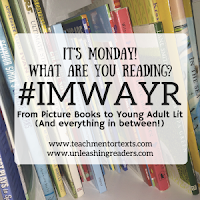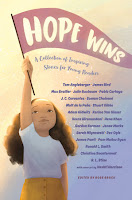

It's
Marvelous Middle Grade Monday
at
at
and #IMWAYR day
at
and
February 8th 2022 by MITeen Press
Copy provided by Young Adult Books Central
I remembers computer punch cards and came of age when people were hooking Tandy TRS-80 Micro Computer systems to their televisions and building their own computers from scratch. I also took coding classes in the '90s and built websites with HTML and Java Script. It amazes me that today's children (the same ones who look at me and say "You're old. How do you know so much about computers?") aren't more interested in coding. This book, which goes along with MIT's App Inventor website (https://appinventor.mit.edu/), is a great step by step way to lure young technophiles into creating their own apps.
This book starts, in fact, with detailed instructions for going to the web site and getting started, no matter what kind of device you might have. Clear text, plenty of white space (well, cream), and screen shots, accompanied by notes that are clearly labeled, make this very helpful for learners who struggle to flip back and forth between screens. Working with this book alongside a device, and being able to flip back and forth, makes it so much easier to use the website.
I especially liked how the elements of the design pages were set up and explained. The App Inventor, which admittedly I have not tried to use, seems to be a bit more sophisticated than a typical drag-and-drop system, but still has some of the ease of that format. The coding blocks are broken into categories,and it's possible to add code without memorizing the language, but is a bit more sophisticated when it comes to choosing functions, which I really appreciated. This makes it quicker, but allows more attention to detail, like using the WYSIWYG "compose" function of a platform like Blogger while being able to switch to the HTML format. There's even a "show warning" button, which can be hugely illuminative when things aren't working.
It's easier to learn things by putting concepts into practice, and there are seven different projects to choose from, including "Hello, It's Me!" and a Translation App. I was absolutely tickled to find "My Piano", since I spent much of the winter of 1979 coding my oboe solo in BASIC on the TRS-80 my family got for Christmas!
App chapters are interspersed with interviews with different kids who code, and it's fascinating to see how children around the world use app creation to address problems that their communities might be facing, like water purity, locating potholes or school buses, and cleaning up vandalized areas. I liked that these biographies addressed the challenges that the coders faced, as well as the successes they had.
I am a digital immigrant who does not enjoy spending any more time on the computer than I have to, even on social media. I have a smart phone only because I couldn't find a dumb phone with a slide out keyboard, and am supremely unlikely to wade into the bracing waters of app creation.
This is a great book to hand to young inventors, along with Saujani's Girls Who Code: Learn to Code and Change the World, Young Rewired State's 2016 Get Coding!: Learn HTML, CSS & JavaScript to Build a Website, App & Game, or other how-to manuals on coding, or who have been inspired by fiction books like Deutsch's Girls Who Code series, Stone's Click'd, Tashjian's My Life as a Coder (My Life #9) or Yang's Secret Coders. My only concern about this book is that it will become obsolete if MIT changes its website at all. Still, this is a very helpful instruction manual for starting to create apps.
Brock, Rose (ed.). Hope Wins: A Collection of Inspiring Stories for Young Readers
June 7th 2022 by Philomel
Copy provided by the publisher
Brock continues on from Hope Nation with a collection of stories for younger readers, written by a selection of authors she knows on the vague topic of hope. Profits from this book are supporting the North Texas Teen Book Festival.
The stories are all very personal, and align fairly well with the authors' previous works. For example, R.L. Stine cleverly twists the assignment to let him write a story about hoping to see a ghost... until he actually does. Rex Ogle and James Bird tell additional stories about their difficult early years, Matt de la Pena offers a sports story, Karina Yan Glaser and Hena Khan write about their own school experiences and how they formed their personalities, and Sarah Mlyowski writes about her younger sister. Julie Buxbaum, who seems to have written primarily young adult titles but is coming out with a middle grade title in September of 2022, admits to being scared of both slumber parties and going to the movies. There are some interesting backstories of some authors who write books that aren't necessarily realistic fiction; Christina Soontornvat writes about growing up with immigrant parents who ran a restaurant and had to deal with difficult individuals, James Ponti explores his struggle with personal identy, J.C. Cervantes waxes lyrical about her relationship to the written word with a poem, Tom Angleberger writes touchingly abohow his autism spectrum was seen as a "major malfunction" when he was younger, and Max Brallier has interesting and formative experiences with large scale hot dogs.
Some authors have very specific tales, like Pam Muñoz Ryan's entry about a friend who changed her life, Adam Gidwitz's lifelong struggle with coolness, and Janae Marks' path towards writing, which adheres most closely to the theme of the book. Ronald L. Smith's essay showcases why there are so many more fantasy books for middle grade readers than one might suspect; he's not the only future author who spent most of his class time sneak reading Tolkien! Veera Hiranandani's reminiscence about a photograph that is her favorite captures a particular moment in her middle school life, and it's great to see something else from her since her Save Me a Seat was so powerful.
Some entries wax more philosophical, like Pablo Cartaya's letter to his daughter, who was was in 8th grade during 2020 and had to struggle with all of the things that the pandemic caused. Stuart Gibbs offers tips on how to deal with grief, which he sadly discovered after the unexpected death of his wife. Sonan Chainani offers a story of victory after defeat.
The real draw here, and the story that I would love to see become a full length book, is "This Can't Be Happening to Gordon Korman", which explains just how this prolific author came to write his first novel in his 7th grade language arts class, get it published, and continue on in his 40+ year career of writing for young people, which now seems to include two books every year. He's told the world about this start many times, but this deep dive into the experience is the story I didn't even know I needed. Of course, there are lots of us who write entire novels in middle school, and most of us shouldn't be encouraged to continue!
This collection reads like letters from friends, passing the time recounting their past, and will please readers who are familiar with some of the authors, and hopefully introduce some new artists. This is the first year I've had requests for short stories, so this will be a good addition to my growing collection of new tales from diverse authors.
Any objections to this are purely personal. It doesn't even make sense to say "hope wins". Hope doesn't win. Luck wins, and no, you can't make your own. Knowing people. Being in the right place at the right time. I don't really know what wins, since I have clearly not mastered the concept of winning at life. Hard work certainly does not win, although it's a more productive distraction than whining, Netflix binges, or "self-care". Hope eventually dies, because even without concrete complaints, life is just a succession of missteps and failures interspersed with tragedies. Hope is a scenic, pleasant road to certain, bitter disappointment.
But it's probably a bad idea to tell middle schoolers that. They'll find out for themselves soon enough, and won't be able to blame us for tarnishing their optimism.


I have one granddaughter who is interesting in coding, will share the book title with her.
ReplyDeleteBoth of these books look wonderful, Karen! Become an App Inventor looks like an excellent guide to helping kids develop their own apps (something I would love to be able to do as well!), and I appreciate the inspiring stories about other kids who created their own apps for specific causes.
ReplyDeleteAs for Hope Wins, it's impressive to see so many well-known authors writing so many unique and powerful stories in one anthology! I laughed out loud reading your thoughts on hope, because you are right—I have family who say that "hope is not a strategy," and I think that sums it up well. Hope is a great motivator, but just hoping things will turn out well tends not to be effective without some kind of planning and intent. Thanks so much for the wonderful reviews!
I too loved the Gordon Korman story although I found many of the others inspiring. I'm also looking forward to participating in the 48 hour MG Readathon.
ReplyDeleteI too remember punching cards to get statistical results from experiments when I was at university. It isn't my favourite memory as I recall that if you didn't punch them exactly right, you ended up trying to figure out where you screwed up. It took a lot of time.
ReplyDeleteI also remember teaching coding to students in grades 3 & 4 on the school's lab of Comodore 64s. It was about all they were good for, but the children enjoyed it.
Thanks for the heads up about Hope Wins. I will be looking forward to it.
I enjoyed reading your thoughts on these books. I have Hope Wins on my TBR and found your analysis of the word "hope" interesting.
ReplyDeleteRemember the computer punch cards in college. We've come so far. I would think that techno kids would be interested in coding and making their own apps.
ReplyDeleteI have a copy of Hope Wins, but haven't read my copy yet. After your review, I look forward to reading it. Thanks for sharing today!
I think I might pick up Hope Wins just to read Gordon Korman's story. I'm reading one of his books right now. Thanks for the recommendations.
ReplyDelete